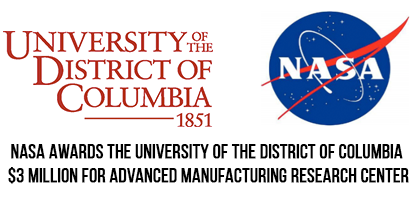
NASA Awards the University of the District of Columbia $3 Million for Advanced Manufacturing Research Center

August 1, 2019
FOR IMMEDIATE RELEASE
Contact: John Gordon, Jr. Communications Director
202.274.5998 (o) or 202.697.1310 (c) or john.gordon@udc.edu
Click here to download the press release.
NASA AWARDS THE UNIVERSITY OF THE DISTRICT OF COLUMBIA
$3 MILLION FOR ADVANCED MANUFACTURING RESEARCH CENTER
Washington, DC – The National Aeronautics and Space Administration (NASA) is awarding the University of the District of Columbia (UDC) $3 million over the next three years to establish a Center for Advanced Manufacturing in Space Technology & Applied Research (CAM-STAR). CAM-STAR will focus on research investigating various advanced manufacturing (AM) techniques and their application in space exploration technology. The Center’s research activities will leverage UDC’s educational goals and the faculty’s expertise to prepare a diverse, skilled science, and engineering workforce in AM research and engineering with a focus on space technology and applications.
“This NASA award bolsters the University’s research prowess in advanced manufacturing, and recognizes UDC’s faculty and students as major contributors to the ever-growing research ecosystem in the Washington metropolitan area,” says Dr. Victor McCrary, Vice-President for Research and Graduate Programs at UDC.
The CAM-STAR’s goals and objectives are aligned with UDC’s mission and goals to serve the needs of the community of the District of Columbia, and to produce lifelong learners who are transformative leaders in the workforce, government, nonprofit sectors and beyond. CAM-STAR’s proposed research projects are well aligned with NASA’s Space Technology Mission Directorate (STMD) in the areas of advanced manufacturing methods for space; low size, weight, and power components for small spacecraft, including power generation and energy storage; thermal management; and in situ resource utilization (ISRU) for missions to Mars.
The proposed research activities will be integrated seamlessly with UDC’s educational activities, with a focus on student-active teaching and learning from the middle school to PhD levels. Additional activities will include experiential learning for undergraduate and graduate students, with courses focused on advanced manufacturing, scholarships for undergraduate and graduate students to conduct research and take part in summer internships at NASA Centers, and establish a Space STEM (science, technology, engineering, and mathematics) Outreach Program for middle- and high-schoolers, teachers and community colleges, and minority-serving colleges, to increase awareness and engagement with NASA-related areas. Through these integrated activities, CAM-STAR is expected to significantly build UDC’s research capacity in NASA-related advanced manufacturing research, and to develop a diverse STEM workforce for the space industry and the nation.
“We are extremely honored to receive this prestigious award from NASA,” says Dr. Jiajun Xu, the principal investigator for this grant. “It provides us with a great opportunity and critical support to establish a state-of-the art research and education center in Advanced Manufacturing here at the University of the District of Columbia.”
Dr. Jiajun Xu is an Associate Professor of Mechanical Engineering in UDC’s School of Engineering and Applied Sciences. He earned his Ph.D. in Mechanical Engineering from the University of Maryland, College Park. He was also an lan A. James Clark School of Engineering “Future Faculty Program Fellowship” Recipient (2010-2013), and he was awarded the Ann G. Wylie Dissertation Fellowship (Presidential Award) in 2013 for his outstanding Ph.D. work. He holds a master’s degree in Mechanical Engineering, and a bachelor’s degree in Power Engineering. At UDC, Dr. Xu’s interests include micro- and nano-scale thermal transport and energy conversion; additive manufacturing; innovative thermal management techniques; and multi-scale modeling and simulation.
The University of the District of Columbia (UDC) is the nation’s only exclusively urban land-grant public Historically Black University (HBCU), and serves the residents of the District of Columbia and the surrounding region. The transdisciplinary research conducted by UDC focuses on areas which increase urban sustainability and resiliency in agriculture, business, engineering, workforce development, law, social justice, the arts, and sciences.